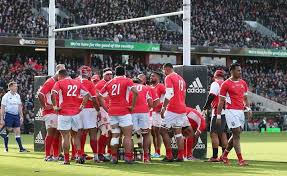TOKYO, 16 SEPTEMBER 2019 (RNZ PACIFIC) – Samoa, Tonga and Fiji are in Japan – just three of 20 teams vying for the Rugby World Cup.
But the Pasifika influence spreads far beyond those three teams. Over 20 percent of players at the tournament will be of Pacific Island descent.
Vinnie Wylie is following the Pacific teams in Japan for Radio New Zealand International.
“Pick a country and there’s probably somebody of Pacific Island descent in there,” he says.
“The Tongan rugby CEO Fe’ao Vunipola – former Tongan international, played at World Cups himself – his two sons Mako and Billy Vunipola that are in the England team and have also played for the British Lions – so Tonga’s going to play England so there he is going to be watching his sons play against the team that he’s representing.”
Fe’ao used to play professionally in England and his sons grew up and have made their lives over there – “it just kind of weaves its way through all sorts of countries,” says Wylie.
While the Vunipola brothers will play side by side, other brothers will play against each other. It’s one of the issues facing a grossly underfunded trio of teams.
Fijians are particularly susceptible to the Pacific diaspora – young players are often plucked from development camps and end up in France, where after three years’ residency (soon to be five) they can play for France.
Getting their “boys” back from all over the world is a mission.
In the Tongan team, players belong to five different New Zealand franchises, making getting them together difficult. Other players overseas often can’t come back, the threat being made that if they leave their club they’ll lose their contract. They can’t afford that.
“The biggest challenge for Pacific Island rugby players, that people in New Zealand, Australia or Europe don’t have to think about, is if they want to make a living from this sport … they have to go offshore. There’s no logical option to play at home,” says Wylie.
Those who have dual citizenship in New Zealand and the islands often don’t like to cut off their chance of an All Black contract by playing for the smaller nation.
While the Pacific trio will have their work cut out for them at the Cup – Fiji for example plays Australia first up – the pressure was on even before they left.
The world champion All Blacks pretty much have everything laid out for them, and while they’re away they’ll get $7500 a week. The Tongan players will be paid $500. Wylie was asked for one interview to use WhatsApp – because the players use their own phones.
At a big event in Australia for Samoa thousands of dollars were raised – for basic things like extra baggage for them on the plane, and strapping tape – things that would come out of the players’ own pockets otherwise.
New Zealand rugby officials don’t think there’s a quick fix for the inequity issue – but it’s hoped that after the tournament when the talking begins, some of these issues can get an airing.
“People want things to change, and there are some ex-players willing to speak out,” says Wylie.
He’s spoken to The Detail’s Sharon Brettkelly about what’s being done to address the unfairness in terms of scheduling, and closing what’s become an increasing gap between the tier one and tier two countries.




